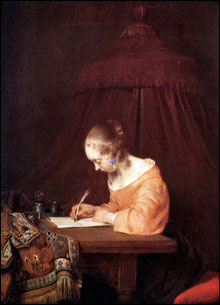|
|
|
|

Gerard ter Borch. Woman Writing a Letter, c1655.
A Letter to Mr. Creech at Oxford, Written
in the Last Great Frost.
Daphnis, because I am your debtor
(And other causes which are better)
I send you here my debt of letter.
You should have had a scrap of nonsense,
You may remember left at Tonson's.
(Though by the way that's scurvy rhyme, Sir,
But yet 'twill serve to tag a line, Sir.)
A billet-doux I had designed then,
But you may think I was in wine then;
Because it being cold, you know,
We warmed it with a glass—or so,
I grant you that shie wine's the devil,
To make one's memory uncivil;
But when 'twixt every sparkling cup,
I so much brisker wit took up;
Wit, able to inspire a thinking;
And make one solemn even in drinking;
Wit that would charm and stock a poet,
Even instruct————who has no wit;
Wit that was hearty, true, and loyal,
Of wit, like Bays', Sir, that's my trial;
I say 'twas most impossible,
That after that one should be dull.
Therefore because you may not blame me,
Take the whole truth as ——— shall sa' me,
From White-Hall, Sir, as I was coming
His sacred Majesty from dunning,
Who oft in debt is, truth to tell,
For Tory farce, or doggerell,
When every street as dangerous was,
As ever the Alpian hills to pass,
When melted snow and ice confound one,
Whether to break one's neck, or drown one,
And billet-doux in pocket lay,
To drop as coach should jolt that way,
Near to that place of fame called Temple,
(Which I shall note by sad example)
Where college dunce is cured of simple,
Against that sign of whore called scarlet,
My coachman fairly laid pilgarlick.
Though scribbling fist was out of joint,
And every limb made great complaint;
Yet missing the dear assignation,
Gave me most cause of tribulation.
To honest H—le I should have shown ye,
A wit that would be proud t'have known ye;
A wit uncommon, and facetious,
A great admirer of Lucretius,
But transitory hopes do vary,
And high designments oft miscarry,
Ambition never climbed so lofty,
But may descend too fair and softly,
But would you'd seen how sneakingly
I looked with this catastrophe
So saucy Whig, when plot broke out,
Dejected hung his snivelling snout,
So Oxford member looked, when Rowley
Kicked out the rebel crew so foully;
So Perkin once that god of Wapping,
Whom slippery turn of state took napping,
From hope of James the Second fell
Into the native scounderel.
So lover looked of joy defeated,
When too much fire his vigour cheated,
Even so looked I, when bliss depriving,
Was caused by over-hasty driving,
Who saw me could not choose but think,
I looked like brawn in sousing drink.
Or Lazarello who was showed
For a strange fish, to th' gaping crowd.
Thus you by fate (to me sinister),
At shop of book my billet missed, Sir.
And home I went as discontent,
As a new routed parliament,
Not seeing Daphnis ere he went.
And sure his grief beyond expressing,
Of joy proposed to want the blessing;
Therefore to pardon pray incline,
Since disappointment all was mine;
Of Hell we have no other notion,
Than all the joys of Heaven's privation;
So, Sir, with recommendments fervent,
I rest your very humble servant.
Postscript
On twelfth-night, Sir, by that good token,
When lamentable cake was broken,
You had a friend, a man of wit,
A man whom I shall ne'er forget;
For every word he did impart,
'Twas worth the keeping in a heart:
True Tory all, and when he spoke,
A god in wit, though man in look.
—To this your friend—Daphnis address
The humblest of my services;
Tell him how much—yet do not too,
My vast esteem no words can show;
Tell him—that he is worthy—you.
|
Source:
Behn, Aphra. Oroonoko, and Other Writings. Paul Salzman, ed.
Oxford: Oxford University Press, 1994. 243-246.
 | to Works of Aphra Behn |
Site copyright ©1996-2011 Anniina Jokinen. All Rights Reserved.
Page created by Anniina Jokinen on June 23, 2006. Last updated on March 2, 2011.
|
|
|